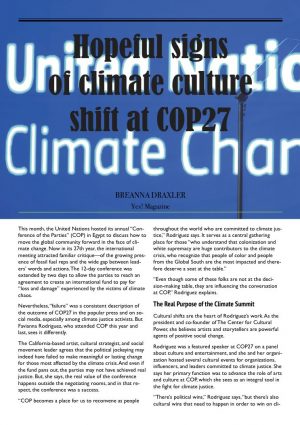 This month, the United Nations hosted its annual “Conference of the Parties” (COP) in Egypt to discuss how to move the global community forward in the face of climate change. Now in its 27th year, the international meeting attracted familiar critique—of the growing presence of fossil fuel reps and the wide gap between leaders’ words and actions. The 12-day conference was extended by two days to allow the parties to reach an agreement to create an international fund to pay for “loss and damage” experienced by the victims of climate chaos.
This month, the United Nations hosted its annual “Conference of the Parties” (COP) in Egypt to discuss how to move the global community forward in the face of climate change. Now in its 27th year, the international meeting attracted familiar critique—of the growing presence of fossil fuel reps and the wide gap between leaders’ words and actions. The 12-day conference was extended by two days to allow the parties to reach an agreement to create an international fund to pay for “loss and damage” experienced by the victims of climate chaos.
Nevertheless, “failure” was a consistent description of the outcome of COP27 in the popular press and on social media, especially among climate justice activists. But Favianna Rodriguez, who attended COP this year and last, sees it differently. The California-based artist, cultural strategist, and social movement leader agrees that the political jockeying may indeed have failed to make meaningful or lasting change for those most affected by the climate crisis. And even if the fund pans out, the parties may not have achieved real justice. But, she says, the real value of the conference happens outside the negotiating rooms, and in that respect, the conference was a success.
“COP becomes a place for us to reconvene as people throughout the world who are committed to climate justice,” Rodriguez says. It serves as a central gathering place for those “who understand that colonization and white supremacy are huge contributors to the climate crisis, who recognize that people of color and people from the Global South are the most impacted and therefore deserve a seat at the table.”
“Even though some of these folks are not at the decision-making table, they are influencing the conversation at COP,” Rodriguez explains.
The Real Purpose of the Climate Summit
Cultural shifts are the heart of Rodriguez’s work. As the president and co-founder of The Center for Cultural Power, she believes artists and storytellers are powerful agents of positive social change.
Rodriguez was a featured speaker at COP27 on a panel about culture and entertainment, and she and her organization hosted several cultural events for organizations, influencers, and leaders committed to climate justice. She says her primary function was to advance the role of arts and culture at COP, which she sees as an integral tool in the fight for climate justice.
“There’s political wins,” Rodriguez says, “but there’s also cultural wins that need to happen in order to win on climate.”
“I don’t want to sound cheesy, but I feel like … the Earth warriors of climate resistance are all convening” at COP, she says. “There’s no other space like that.”
Even so, Rodriguez says COP27 differed from last year’s gathering in Glasgow, Scotland, in many ways.
In Glasgow, she says, many of the events were open to the public, providing ample opportunity for participation from civil society. Rodriguez and The Center for Cultural Power were able to host film screenings and conversations.
But Egypt was a very different story, she says. Hosting COP27 in the resort city of Sharm El Sheikh made attendance prohibitively expensive for many. And the Egyptian government outlaws public protest, which denied climate activists access to a historically effective communication and bargaining tool at the conference. Whether or not this was the intention of the event organizers, “they are making it very hard for people to go to COP,” Rodriguez concludes.
Still, the underlying goal of cultural leaders like Rodriguez remains the same: build relationships. And because the conference forced them to meet with intention in uncommonly intimate spaces, that aspect was a great success.
Even with the decreased presence of civil society leaders, Rodriguez says she was excited to see the growing number of change-makers pushing back on these world governments, at COP and beyond.
“They look very different than the people in the room, right? But they’re there,” she says. “It tells me that there’s a cultural shift already happening that’s shaping the conference.”
The Twofold Goal of COP27
The political negotiations themselves at the conference are often frustrating and demoralizing, with copious amounts of posturing and presenting false solutions, Rodriguez says. Looking at the leaders who make global climate decisions, Rodriguez acknowledges that COP is “a patriarchal, white supremacist, male-centric, multinational operation that gets very little done.”
Those world leaders, let alone COP leadership, “[don’t] reflect the growing constituency of people who are demanding more from COP,” she says. And yet, “it was also really powerful to just see the growing number of young people who are taking up more space.”
That space includes a coming-together of grassroots communities, impacted communities, and Indigenous communities from throughout the world, who show up to apply pressure so world governments take action on climate.
Rodriguez adds that COP does provide critical space for building alignment among those within the movement about how to talk about climate. That space is about gathering those most impacted by climate change and then strategizing and coming up with shared messaging, she explains. It’s about coming together as a united front to create momentum for real change.
“Movement leaders are being effective in really pushing forward a frame of reparations,” Rodriguez says. “Now that’s different than … the political outcomes of the negotiations, but the fact that they’re getting on the agenda and even that that ‘loss and damage’ is something so central to the agenda, that to me is signaling a cultural shift.”
Indeed, “loss and damage” was language that was entirely absent from last year’s COP26, but played a defining role in this year’s negotiations.
Rodriguez also sees each COP as an opportunity to increase conversation and understanding between political leaders and communities most impacted by climate change. By attending COP, she and other community leaders are able to report back and help their communities digest the takeaways and participate more meaningfully.
“My hope is that more and more people from the broader public, especially from impacted communities, get to understand, ‘How does this thing work? Why is it important that our voices are represented there?’” Rodriguez says.
Ultimately, the goal is “about Indigenous people having more control and power over climate solutions,” Rodriguez says. That’s in direct contrast to what she calls “false solutions” that all too often come from these kinds of meetings. “We don’t want greenwashing,” she adds. “We don’t want fossil fuel companies proposing solutions.”
Cultural Climate Challenges Remain
Rodriguez says she left COP27 with a clear pathway toward what can be done in the U.S.—which she calls a center of global culture—in a way that centers those most impacted.
But the job doesn’t stop at COP, she adds. The next step is translating these messages into pop culture and cultural norms. And that’s a heavier lift.
“We’re not winning on climate when it comes to culture. We’re just not,” Rodriguez acknowledges. “More has to be done. And I think part of the problem is that climate has kind of stayed in this very scientific, politically wonky arena, and we have to make it more accessible and help people feel that it’s important to them. But in order to do that, we need to have the cultural strategy.”
She points to social media influencers who are creating new conversations and setting the tone, especially among young people, who will continue to experience the worsening effects of climate change.
“They’re shaping politics,” she says. And these influencers and activists know full well that mass audiences don’t engage with political back-and-forth. They engage with stories. And that’s why she puts so much of her energy and effort into telling stories of climate solutions.
Rodriguez is hopeful about shifting the culture around climate to center climate justice, though she knows it requires perseverance, resilience, and fortitude. She sees successful models for this kind of cultural shift in the growing embrace of The Movement for Black Lives, as one example.
“At some point, there has to be a power shift,” Rodriguez says. “The power shift hasn’t happened yet. But the cultural shift is moving.”
Breanna Draxler
Originally published
by Yes! Magazine
November 23, 2022



